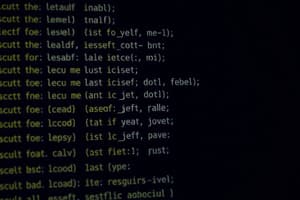Podcast
Questions and Answers
What is the main purpose of comments in Python?
What is the main purpose of comments in Python?
- To increase execution speed of the code.
- To make the code more readable and to explain the code's functionality. (correct)
- To define the data types of variables.
- To create new variables in the code.
How can you create a multiline comment in Python?
How can you create a multiline comment in Python?
- It cannot be done in Python.
- By defining a list of strings.
- Using triple quotes without assigning them to a variable. (correct)
- By using a single hashtag at the beginning of each line. (correct)
What happens when you assign a new value of a different type to a variable in Python?
What happens when you assign a new value of a different type to a variable in Python?
- The variable's type changes dynamically to the new value's type. (correct)
- The variable retains its original type.
- Python raises a syntax error.
- The variable becomes persistent and cannot change.
How can you specify the data type of a variable during assignment?
How can you specify the data type of a variable during assignment?
What is the correct method to get the type of a variable in Python?
What is the correct method to get the type of a variable in Python?
What will be the output of the following code?
print(random.randrange(1, 10))
What will be the output of the following code?
print(random.randrange(1, 10))
Given the string a = 'Hello, World!', what would print(a[1]) output?
Given the string a = 'Hello, World!', what would print(a[1]) output?
What does the len() function return when applied to the string a = 'Hello, World!'?
What does the len() function return when applied to the string a = 'Hello, World!'?
What will the following code print when executed?
if 'free' in txt:
print('Yes, "free" is present.')
else:
print('No, "free" is NOT present.')
``` where `txt = 'The best things in life are free!'`?
What will the following code print when executed?
if 'free' in txt:
print('Yes, "free" is present.')
else:
print('No, "free" is NOT present.')
``` where `txt = 'The best things in life are free!'`?
What does the expression expensive' not in txt evaluate to when txt = 'The best things in life are free!'?
What does the expression expensive' not in txt evaluate to when txt = 'The best things in life are free!'?
Flashcards are hidden until you start studying
Study Notes
Python Comments
- Comments are used to explain code, enhance readability, and prevent execution during testing.
- A comment starts with
#and is ignored by Python. - Comments can also be placed at the end of lines.
- Multiline comments can be created by adding
#at the beginning of each line or using triple quotes for string literals.
Python Variables
- Variables act as containers for storing data values and are created upon first assignment.
- No explicit declaration is necessary; variables can change type dynamically (e.g., from integer to string).
- Casting is possible to enforce specific data types using functions like
str(),int(), andfloat(). - The data type of a variable can be determined using the
type()function. - Variable names are case-sensitive.
Random Numbers
- To generate random numbers, Python utilizes the built-in
randommodule. - Example usage:
import randomfollowed byprint(random.randrange(1, 10))generates a random number between 1 and 9.
Strings and Arrays
- Strings in Python are arrays of bytes representing Unicode characters; single characters are considered strings of length 1.
- Elements of a string can be accessed using square brackets.
- The length of a string is obtained with the
len()function. - Use the
inkeyword to check for specific phrases or characters within a string.
String Manipulation
- Slicing allows extraction of a substring from a string using index ranges.
.upper()converts a string to uppercase, while.lower()converts it to lowercase.- The
strip()method removes leading and trailing whitespace from a string. - Strings can be concatenated using the
+operator, with an option to include spaces.
String Formatting
- F-Strings, introduced in Python 3.6, allow embedding expressions inside string literals prefixed with 'f'.
- Placeholders within f-strings can contain variables, operations, and modifiers for formatted output (e.g.,
{value:.2f}for two decimal places).
Python Conditions and If Statements
- Python supports standard logical conditions such as
==,!=,<,>,<=,>=. - The
ifstatement executes code based on evaluated conditions. elifallows multiple conditions to be checked in sequence, whileelsehandles cases when no preceding conditions are true.- Indentation is crucial for defining code blocks; it replaces the need for curly braces.
- Conditional expressions can be expressed in a single line using shorthand syntax.
Logical Operators
and,or, andnotare logical operators used to combine or negate conditions in statements.- Nested if statements are permitted, allowing complex conditional logic within the defined scope.
- The
passstatement can be used as a placeholder in an empty if statement to avoid syntax errors.
Studying That Suits You
Use AI to generate personalized quizzes and flashcards to suit your learning preferences.




